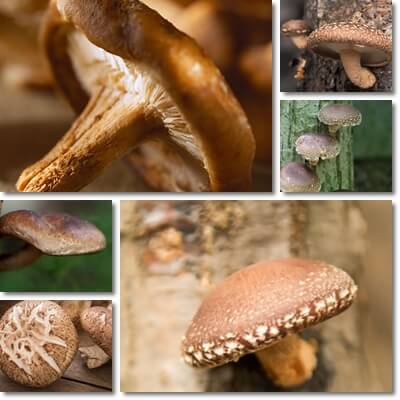Shiitake are becoming one of the most popular edible mushrooms in Western cuisine, despite being somewhat of an an acquired taste compared to the more common portobello, crimini or button mushrooms. Those who appreciate the particular taste and flavor profile of shiitake and, as a result, eat them regularly, can enjoy a range of benefits derived primarily from the nutritional profile of the mushroom species. Aside from potent biologically active compounds such as the polysaccharide lentinan which studies say has anti-inflammatory and anticancer properties, shiitake are rich in B vitamins and a good source of manganese, potassium, phosphorus, selenium and zinc.
Compared to other commonly preferred edible mushrooms, shiitake are more nutritious which adds to their market value and therapeutic potential. Shiitake are available either fresh or dried, or in powder form, to be taken as a nutritional supplement. Dried shiitake concentrate more nutrition compared to fresh ones which are almost 90% water, but both are good options for anyone looking to upgrade their dietary choices for a healthier lifestyle and better overall health. Of course, intake is best kept moderate and in accordance to individual nutritional requirements.

Shiitake are not without side effects, but generally provoke fewer and less severe adverse reactions compared to other common edible mushrooms. While they do cause an allergic dermatitis, the skin rash is self-resolving and does not usually build up to anaphylactic shock. Also, shiitake is not a common food allergen so the chances for allergic reactions that have the potential to lead up to anaphylactic shock are lower. Given they grow on trees and tree logs and that most mushrooms available for consumption are from mushroom farms, heavy metal contamination is also less likely in shiitake.
What are shiitake good for?
1) Good for a healthy digestive system. A serving of 100 g of the fresh mushrooms provides 2.5 of dietary fiber, while the same amount of dried shiitake provides 11.5 g of dietary fiber. Dietary fiber is essentially indigestible plant material. While it does not contribute to human nutrition in the same way vitamins, minerals, protein, fat or carbohydrates do, it is a source of important health benefits. For example, dietary fiber ferments and feeds good gut bacteria whose activity achieves digestive system health. The prebiotic effect of shiitake makes the mushroom a good food to eat for a healthy digestive system. A particularly beneficial prebiotic compound in shiitake is the beta-glucan lentinan, a polysaccharide and insoluble fiber which helps establish and restore healthy gut bacteria populations. This, in turn, holds benefits for digestion and nutrient absorption as well as positively impacts the immune function.
2) Support for healthy weight loss. Shiitake mushrooms are good for weight loss. All mushrooms are, actually. Shiitake are low in calories and fat, but a good source of dietary fiber. Having a low energetic value and fat content, they contribute to a lower calorie intake, while dietary fiber reduces fat absorption at the intestinal level by binding to it. The fresh mushrooms have only 34 kcal (kilocalories) per 100 g. Of course, one food does not offset the effects of your entire diet so expecting to lose weight just because you are eating shiitake or any other food really is wishful thinking.

3) Cholesterol-lowering properties. You can eat shiitake for better cholesterol levels. On the one hand, the mushroom is a good source of dietary fiber which reduces intestinal absorption of fat in general and contributes to weight management, indirectly contributing to better cholesterol numbers. On the other hand, it is rich in vitamin B3 (niacin). The vitamin has been found to lower low-density lipoprotein or LDL cholesterol levels as well as very low-density lipoprotein or VLDL cholesterol and triglyceride levels. At the same time, studies show a sufficient intake of vitamin B3 (niacin) raises high-density lipoprotein or HDL cholesterol levels (the good kind) which further benefits cardiovascular health. A serving of 100 g of fresh shiitake provides 3.8 mg of vitamin B3, while a serving of 100 g of the dried mushrooms provides 14 mg of vitamin B3. According to the new RDI’s, an adult woman requires 14 mg of vitamin B3 a day, while an adult man requires 16 mg of vitamin per day.
4) Benefits for blood pressure. Eating shiitake for better blood pressure numbers is actually a good idea. Shiitake mushrooms are naturally very low in sodium. At the same time, they have a good magnesium and potassium content, two minerals that counteract the blood pressure-rising effects of sodium. A serving of 100 g of the fresh mushrooms provides 20 mg of magnesium (out of the 400 mg recommended daily intake) and 304 mg of potassium (out of the 4500 mg recommended daily intake). A serving of 100 g of the dried mushroom provides over 35% of the recommended intake of magnesium for an entire day (over 130 mg), and 33% of the recommended intake of potassium per day (over 1500 mg).
5) Benefits for fertility. Because of their good selenium and zinc content, shiitake are good for fertility. Selenium is one of two key-nutrients for thyroid health (the other being iodine). By supporting thyroid function and thyroid hormone production, selenium contributes to endocrine health and indirectly boosts fertility. Zinc further helps regulate hormone production and is especially good for male fertility. If you are looking to become pregnant, making sure you have enough zinc, selenium, but also iodine and vitamins C and D in your diet can contribute to higher conception chances. A serving of 100 g of fresh shiitake provides over 10% of the daily requirements of both selenium and zinc, whereas a serving of 100 g of dried shiitake around 80% of daily requirements of both minerals.
6) Shiitake for skin health. The skin is one of the organs most susceptible to B vitamin deficiencies and associated side effects (dry skin, cracks and lesions, hyperpigmentation, susceptibility to infections). Only 100 g of the fresh mushrooms provides around 20% of daily requirements of vitamins B2 and B6, around 25% vitamin B3 and about 30% vitamin B6. All of these B vitamins hold benefits for skin health, nourishing skin from within. Dried shiitake are even richer in B vitamins.
7) Anticancer properties. The scientific name for shiitake is Lentinula edodes – the first term designating one of the most potent biologically active compounds in the mushroom species, lentinan, a polysaccharide, glucose molecule and beta-glucan. Studies show lentinan is a strong immuno-modulator found to increase the production of white blood cells and enhance the immune system function, hence the anticancer properties attributed to shiitake mushrooms. While the compound does not constitute a treatment for cancer, preliminary studies show it has promising anticancer properties.
A study conducted on 52 healthy adults, aged 21-42, showed eating 5 t0 10 g of shiitake mushrooms every day for 4 weeks improved the immune system response by increasing the production of T-cells and enhancing their function. Another study on mice showed oral administration of lentinan reduced growth of human colon carcinoma tumors. Other studies are currently investigating lentinan for its potential as an adjuvant therapy in cancer treatment, in combination with traditional cancer treatments and therapies. So far, results show the compound has the potential to increase survival time, an effect attributed to its immune system-boosting properties.
Source: https://www.ncbi.nlm.nih.gov/pubmed/25866155
Source: https://www.ncbi.nlm.nih.gov/pubmed/12470439
